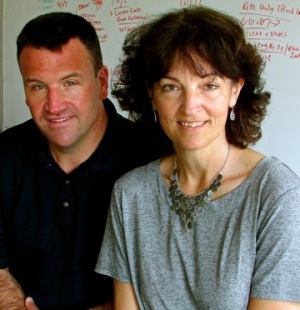Startup company Burbio began as parents’ scheduling solution
Julie and Dennis Roche never had an efficient way to keep track of their four sons”™ different schedules until they created one themselves, called Burbio. The Pelham couple turned the digital calendar site into a community resource and a tech startup that Dennis said has grown quickly since the launch of the latest version in September.
Burbio is a platform for any entity, as big as a town or as small as a varsity soccer team, to upload their public calendar. Users can automatically add all the events from certain calendars or handpick a few to put on their own online calendar. Burbio enables organizations to spread the word and families to know what”™s happening in their communities.
While Apple, Google, Outlook and sports leagues offer digital calendars, Julie said there”™s no platform that automatically compiles different schedules into one place. Burbio can sync with Apple”™s iCal and Google Calendar, as well as send email updates when times or venues change.
“There are all these different places out there right now, but they”™re not connected,” Julie said. “So we kind of connect that last mile to provide a really simple solution that brings it all together in one place.”
The Burbio idea began two years ago when Dennis and Julie were talking about how hard it was to keep track of their volunteer organizations and their kids”™ schedules. Dennis recalled searching through emails to find out when and where his son”™s ever-changing soccer practices were.
Having spent the past two decades growing media startups, Dennis considered starting a company to solve this problem. He said he has experience with business development, ad sales and raising money. Dennis was co-founder of Beyond the Wall, a targeted media publication, then became president of Youthstream, a marketing firm. Since then he has worked as president of Zoom Media and Access Sports Media.
Julie had worked in marketing and market research for 15 years and had been doing project-based consulting when she started Burbio. She thought of the calendar platform and took the lead on creating the site. She said her experience working with customers translated into product development for Burbio.
With more experience in marketing than coding, she completed a 16-week course on front- and back-end Web development at General Assembly in Manhattan to be able to communicate with developers. Initially, it involved 100-hour weeks and getting on Skype at 5 a.m. to talk to developers in India and Russia. The company has since switched to a team in Kansas City, which is only one time zone away. She also taught herself a prototyping software to test the site.
In March, Dennis made the transition from live-in consultant to his wife to full-time employee at Burbio when he left Access Sports Media, where he worked for two years.
The Roches invested about $50,000 of their own money to start the business. This went toward launching and building the app, going to trade shows and paying legal fees to trademark the logo and incorporate the company. They launched the beta product about a year ago in Pelham.
In the spring, the Roches raised $500,000 in an angel round from individual investors. They are continuing to pitch with hopes of raising more money next spring.
“You network like crazy,” Dennis said. “I think this was a product that resonated with investors who understood the need, or understood why it was a problem, and liked what we said about our solution.”
The seed money helped pay for employee salaries, building out the product, hosting the servers and technology.
In September, they released version 2.0 with new features like recommended events on a users”™ home page and improved notifications when event information changes. As of
mid-November, people from about 40 different ZIP codes are connected to upward of 1,000 calendars on the site from nonprofits, schools, churches, sports teams and other organizations. There have been 5,000 unique visitors, and about 20,000 events have been added to personal calendars.
“I really fully expect there”™s going to be another zero next to both those numbers inside of 90 to 120 days because of the way we”™re growing,” Dennis said.
Like many young tech startups, Burbio isn”™t profitable yet. The Roches are selling ZIP code-specific advertising and have sponsored emails. In the spring they will expand into Fairfield County, Conn. They also plan to create a mobile app.
In the future, Dennis said, the company could offer premium services and charge a subscription rate. He said the Roches are also considering providing resources to businesses and organizations like ticket sales and event communications. He said with their low overhead, there is potential to grow.
The Roches work in an office a block away from home with one full-time employee, an Iona College graduate who works on marketing, business development and site operations. Burbio also employs seven part-time moms to evangelize the site to expand the product”™s user base in other communities. The Roches want to hire more local employees as the company grows, like a full-time tech team and advertising salespeople.
Dennis said his and Julie”™s backgrounds in volunteer work, plus Julie”™s consumer research experience, make them equipped to understand how to make the product user-friendly. He said he and Julie ran the town soccer league together, so they have experience co-leading an organization. The couple met at Proctor & Gamble, where they worked on different products. At Burbio, they divide responsibilities and check in every morning.
“We sort of have complimentary skill sets,” Dennis said.
The focus now is improving the product and growth, building traction and more partnerships. Dennis said the Roches have been meeting with recreation groups and government agencies and have been receiving positive feedback.
“People really like the idea and we”™re thrilled with how quickly it”™s been adopted,” Dennis said.
